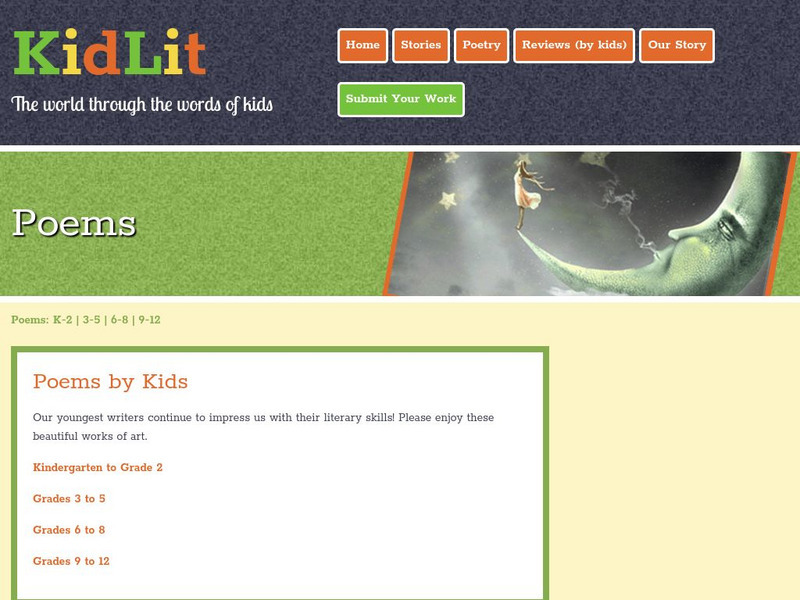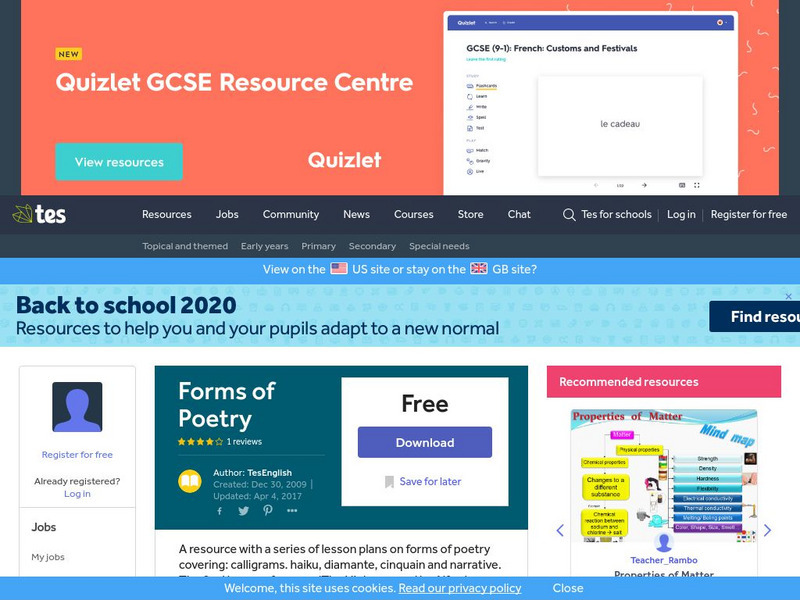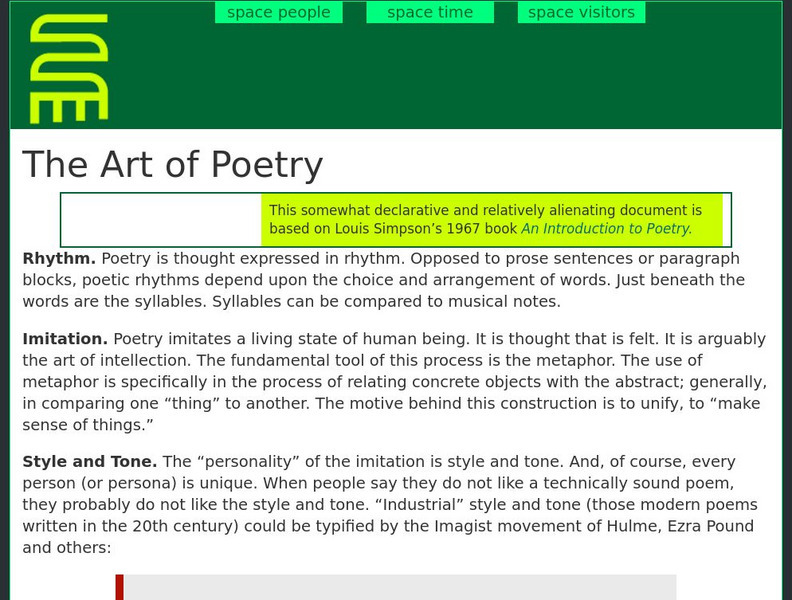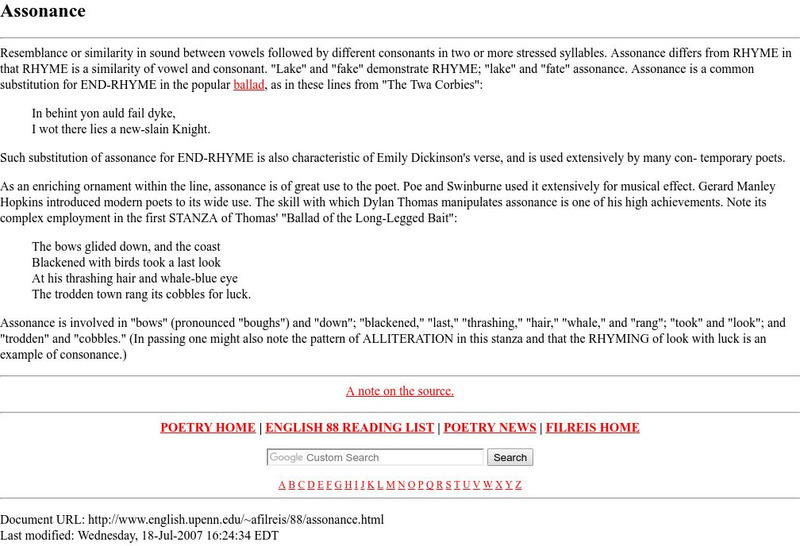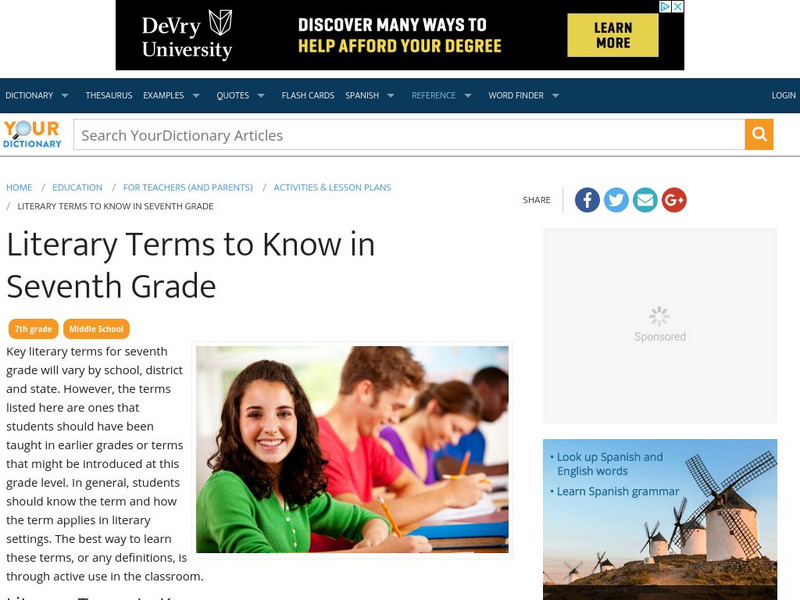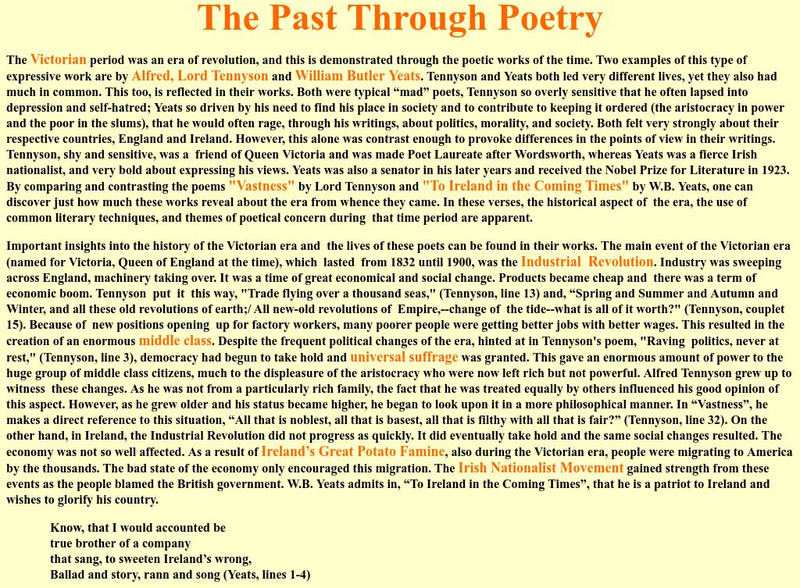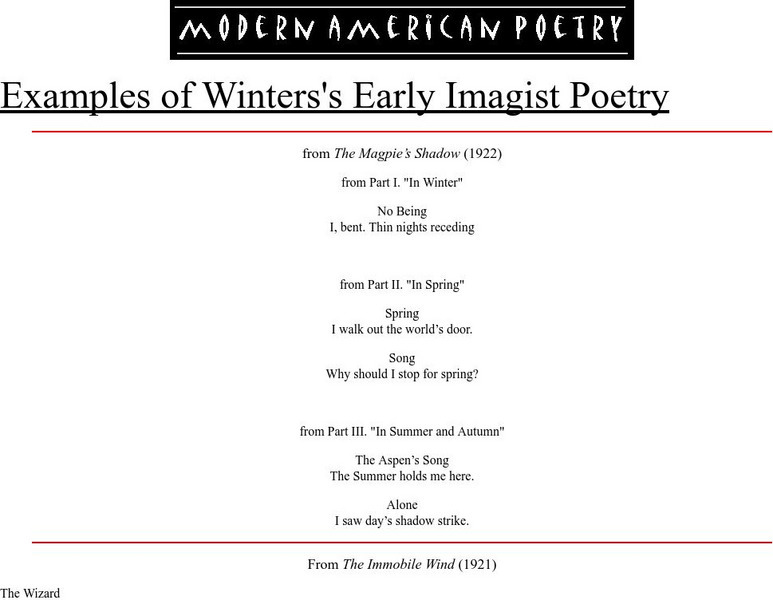Other
Kids Lit: Poems by Kids
Student poets have contributed their poems for publication on this site. Read through the poems and contribute your own.
TES Global
Tes: Forms of Poetry
[Free Registration/Login Required] These Several lessons provide students with an understanding with different types of writing forms: calligram, cinquain, diamante, haiku, and narrative.
Other
Kintespace: The Art of Poetry
This site is an analysis of rhythm, imitation, style, tone, and technique of poetry. References to imagists and their works are also included
Other
Lifestream Center: Lessons: Literary Concepts: Elements of a Story
This site offers a basic understanding of the elements of a story. It clearly defines each literary term.
Washington State University
Washington State University: Epigram/epigraph/ Epitaph/epithet
This site gives a definition of the word "epigram." It also includes a few examples of epigrams.
ClassFlow
Class Flow: Poetry Figurative Language
[Free Registration/Login Required] This flipchart discusses various forms of poetry and gives examples of each. Figurative language is explored as a way of determining the meaning of a piece of literature.
Sophia Learning
Sophia: Breaking the Line: An Exercise for Revision in Poetry
Lesson on crafting and revising lines of poetry. Lineation and enjambment are defined and explored. A Robert Creeley poem is analyzed, and a video of his poem is presented. [1:31]
ReadWriteThink
Read Write Think: Poetry: Sound and Sense
Lesson that gently encourages the teaching of poetry in "nonthreatening" ways. Stresses reading and listening, discussion, and the examination of the sound and sense of poetry.
University of Pennsylvania
University of Pennsylvania: Assonance
This resource provides a detailed explanation of the term "assonance." Several examples provided as well as links to related sites.
ReadWriteThink
Read Write Think: Teaching Poetry Through Riddles
Excellent teaching resource that attempts to teach poetic concepts to middle schoolers by using riddles. Discusses riddles' use of metaphor, simile, and imagery, and relates these concepts to the students' understanding of poetry....
Texas Education Agency
Texas Gateway: Understanding Poetry
You will learn how to find the meanings of words through analogy and other word relationships.
Other
Poets' Graves: Glossary of Poetic Terms
A quite extensive glossary of poetic terms, using examples primarily from British poetry. Terms range from "abecedarian poem" to "zeugma" and very little is left out in between.
Other
Poetry4 Kids: Poetry Lessons
This resource offers guidance through the writing process of writing funny poetry. There are instructions on how to write a clerihew and an exaggeration poem.
Love To Know Media
Your Dictionary: Literary Terms Lesson Plan
This is a lesson plan for teaching the seven literary terms used in poetry: simile, metaphor, alliteration, imagery, hyperbole, personification, and onomatopoeia.
Love To Know Media
Your Dictionary: Literary Terms to Know in Seventh Grade
This site lists and briefly defines the literary terms 7th graders should know including types of writing, literary devices, sound devices, figurative language, and parts of a story,
TED Talks
Ted: Ted Ed: What Makes a Poem a Poem?
Melissa Kovacs shares three recognizable characteristics of most poetry.
Other
University of North Carolina: Glossary of Literary Terms
This site is provided for by the University of North Carolina at Pembroke. Over forty literary terms defined by college students, each with thorough examples.
Other
Chateauguay Valley Regional High School: The Past Through Poetry by Mary Sully
This is a good example of how to write a literary analysis essay on poetry. This example compares and contrasts Tennyson and Yeats, Victorian poets, on the basis of their lives and their poetry. W.9-10.9a Analysis
TED Talks
Ted: Ted Ed: Why Shakespeare Loved Iambic Pentameter
Shakespeare sometimes gets a bad rap in high schools for his complex plots and antiquated language. But a quick peek into the rhythm of his words reveals a poet deeply rooted in the way people spoke in his time- and still speak today....
Academy of American Poets
Poets.org: Poetic Forms
This site shares numerous poetic forms. The following poetic forms are highlighted: rondeau, triolet, pastoral, pantoum, found, ghazal, dramatic monolgue, and blues.
Other
St. Edward's University: Devices: Assonance/consonance
Defines and compares the use of assonance and consonance in poetry, with examples.
University of Illinois
University of Illinois: Examples of Winter's Early Imagist Poetry
Two very good examples of imagist poetry. Links to author.
PBS
Pbs Learning Media: Literary Elements and Techniques: Tone and Mood
Explore the difference between tone and mood in this animated video [2:28] from WNET through definitions and examples from poetry and prose. Discussion questions below help students to further apply their understanding before analyzing a...
English Verse
Englishverse.com
This collection of poetry brings together works by both familiar and little-known poets from England and the United States. While there is no commentary on the poetry, there is frequently a biographical note about the poet. Well over 100...


